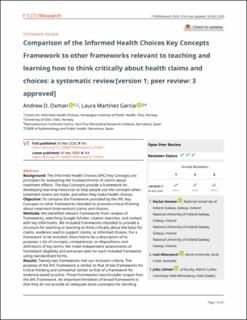| dc.description.abstract | Background: The Informed Health Choices (IHC) Key Concepts are principles for evaluating the trustworthiness of claims about treatment effects. The Key Concepts provide a framework for developing learning-resources to help people use the concepts when treatment claims are made, and when they make health choices. Objective: To compare the framework provided by the IHC Key Concepts to other frameworks intended to promote critical thinking about treatment (intervention) claims and choices. Methods: We identified relevant frameworks from reviews of frameworks, searching Google Scholar, citation searches, and contact with key informants. We included frameworks intended to provide a structure for teaching or learning to think critically about the basis for claims, evidence used to support claims, or informed choices. For a framework to be included, there had to be a description of its purpose; a list of concepts, competences, or dispositions; and definitions of key terms. We made independent assessments of framework eligibility and extracted data for each included framework using standardised forms. Results: Twenty-two frameworks met our inclusion criteria. The purpose of the IHC Framework is similar to that of two frameworks for critical thinking and somewhat similar to that of a framework for evidence-based practice. Those frameworks have broader scopes than the IHC Framework. An important limitation of broad frameworks is that they do not provide an adequate basis (concepts) for deciding which claims to believe and what to do. There was at most some overlap between the concepts, competences, and dispositions in each of the 22 included frameworks and those in the IHC Framework. Conclusions: The IHC Key Concepts Framework appears to be unique. Our review has shown how it and other frameworks can be improved by taking account of the ways in which other related frameworks have been taking account of the ways in which other related frameworks have been developed, evaluated, and made useful. | |
